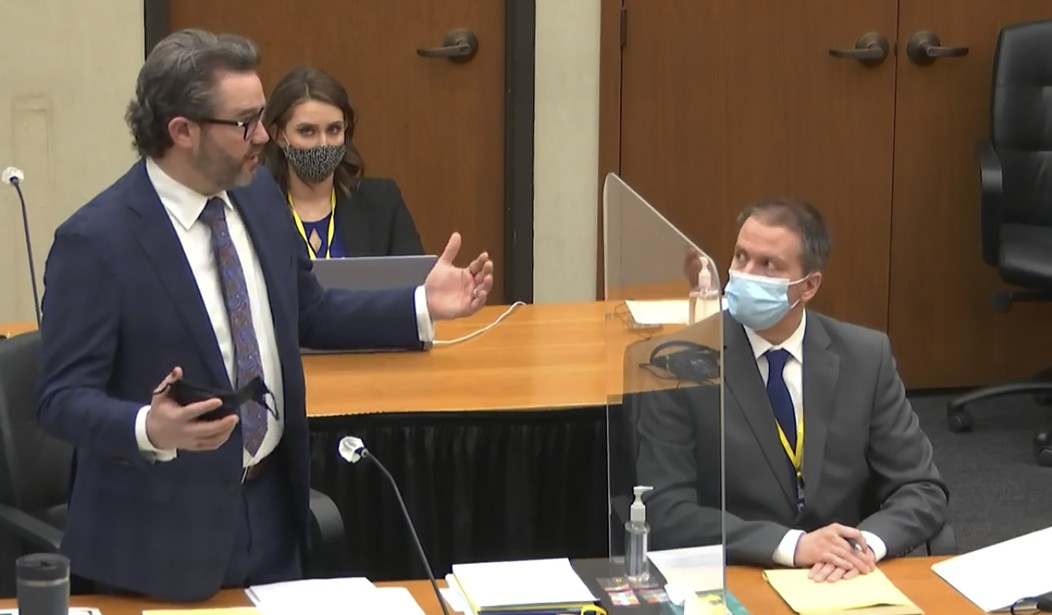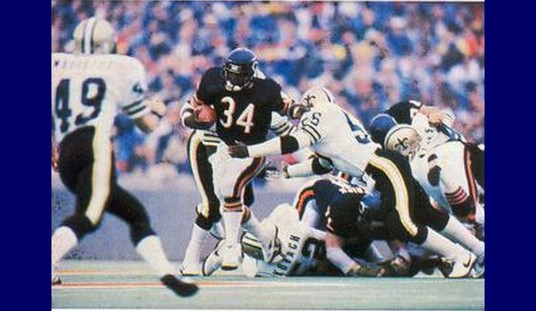Former Minneapolis Police Officer Derek Chauvin’s placement of his knee across the neck and upper back of George Floyd played no role in the death of Floyd.
That should be the top-line takeaway from the first two weeks of the murder trial of Chauvin, as that fact was testified to by the top medical expert called by the prosecution, Dr. Martin Tobin.
After a string of embarrassing expert witnesses whose testimony helped Chauvin more than it helped the prosecution, Dr. Tobin took the stand and testified with regard to his opinions about what caused the death of Floyd. During his testimony, he clearly stated that the positioning of Chavin’s knee had little or no effect on Floyd in connection with the mechanism which caused his death.
For more than 10 months, the media reporting on this incident and the police and prosecution demonizing the conduct of Chauvin have focused public attention on Chauvin’s knee. The prosecution put witnesses on the stand who called what Chauvin did a “blood choke” leading to Floyd’s loss of consciousness and death. Others described the shock and horror they experienced watching Floyd die on the street while Chauvin’s knee pinned his head to the asphalt.
And it was all simply wrong — and the prosecutors knew it was wrong because they knew what their expert was going to say. But they put on the false evidence anyway.
They knew from the autopsy report leaked in the summer of 2020 that Floyd’s airway showed no signs of damage and his breathing was never impaired in that respect. They knew he had not suffered a loss of blood flow to the brain from Chauvin’s knee — rudimentary understanding of a carotid artery chokehold includes knowing that both arteries need to be constricted at the same time to induce someone to pass out and that such a result happens in a matter of seconds, not minutes as was the case on that street in Minneapolis.
As Dr. Tobin explained, Floyd died as a result of the position of his body on a hard surface, the fact he was handcuffed behind his back, and because the four officers at various points in time were using their body weight to pin him to the ground in order to keep him from moving. The combination of these factors caused a decrease in the ability of Floyd’s lungs to expand and contract to take in oxygen. The reduced intake of oxygen into his lungs led to a gradual reduction in brain activity over the few minutes he was kept in that position — as Dr. Tobin explained, brain function consumes 20% of all the oxygen taken in via the lungs. As Floyd’s oxygen intake decreased his brain function declined — including the brain’s signals through the nervous system to Floyd’s respiratory system to breathe. This problem grew gradually worse until he simply stopped breathing altogether. This respiratory arrest led to a heart attack which killed him while he was on the street.
Dr. Tobin is a widely recognized expert who testifies in civil litigation across the country as part of his medical practice which is based in Chicago. The prosecution knew what his testimony would be far in advance of him taking the stand — but only delivered to Chauvin’s attorney the slides and video that would be used by the prosecution the night before he took the stand.
While the media has legal commentators have focused on Dr. Tobin’s testimony and how it points the finger of blame at Chauvin — and the other three officers as well — one aspect of this issue that has received little if any attention. The law provides that even if Chauvin’s conduct was a “substantial contributing factor” in Floyd’s death, Chauvin is still not guilty of any crime unless the prosecution ALSO PROVES that Chauvin’s conduct was “wrongful”. In other words, shooting and killing a suspect is not “wrongful” when the suspect poses a threat of great bodily injury to the officer. The same rationale holds true if Chauvin’s actions towards Floyd were not “wrongful” — a standard which is based on the “totality of circumstances” and based on what a “reasonable officer” in the same situation would have done.
Dr. Tobin’s testimony takes Chauvin’s use of his knee out of the equation. Finding Chauvin guilty is going to come down to a question of whether the specific acts that impaired Floyd’s breathing were “unreasonable” and thereby “wrongful” under a totality of the circumstances. Based on Dr. Tobin’s testimony, that is going to focus on three main issues — 1) that Floyd was on a hard surface in a face-down position, 2) that Floyd was handcuffed behind his back, and 3) that Chauvin and the other officers used their body weight at different times to keep Floyd pinned down to the ground while they waited for EMS to arrive.
To convict Chauvin of “second degree” murder, the jury will be instructed that they must find that “Chauvin intended to kill Floyd”, in that he acted “with the purpose of causing death and believed the act would cause that result.”
There is simply no evidence presented anywhere in the prosecution’s case that would support such a finding, and I would not be surprised if the Judge dismissed this count when the prosecution rests its case.
To convict Chauvin of “third degree” murder, the jury will be instructed that they must find that Chauvin’s “intentional act was imminently dangerous to human beings and was performed without regard for human life.”
Again, the “knee on the neck” is no longer an issue based on Dr. Tobin’s testimony. It was the other three factors that led to Floyd’s inability to breath — being handcuffed in a prone position with Chauvin using body weight to keep him from moving. How will the prosecution argue to the jury that it was “imminently dangerous” and “without regard for human life” when those three tactics are taught to officers as part of their training? Was there a bad outcome in this particular episode? No question. But an atypical bad outcome in this episode is NOT evidence that the actions of Chauvin were “imminently dangerous” or done “without regard for human life.” I would not be surprised if the Judge dismissed this count as well based on the trial evidence.
That leaves the state with the manslaughter charge — a killing of another person by way of a culpably negligent act. To convict Chauvin of manslaughter, the jury will be instructed that they must find that Chauvin’s conduct created an unreasonable risk and that he took a chance of causing death or great bodily harm to Floyd. Chauvin’s conduct must have been intentional, and he may not have intended harm to Floyd, but an ordinary and reasonably prudent officer in the same circumstances would have recognized the strong probability of causing harm to Floyd from the conduct.
As with the murder charges, Chauvin’s knee is not an issue — Dr. Tobin said his analysis was that it did not play a role in Floyd’s inability to breathe.
This is where the “use of force” experts called before the medical experts have greatly undermined the prosecution. You would not know this if you only listened to the direct examination or the media coverage of the direct examination. The cross-examination of those experts by Chauvin’s defense attorney was excellent, and he obtained admissions from all of them that there were circumstances present during the process of Floyd’s arrest and detention that altered the conclusion about what a “reasonable officer” would be expected to do in Chauvin’s position.
Direct examination is ALWAYS effective because it is rehearsed. The prosecutor and the expert have carefully gone over the expert’s opinions, and the questions and answers are carefully scripted out so the jury hears exactly what the prosecutor wants the jury to hear. But an expert’s opinions are only as good as their ability to withstand scrutiny under cross-examination. Every “use of force” expert called by the prosecution took multiple hits when the “unfriendly” questions began. I’m not going to recount them here, but if you want an excellent and detailed analysis, I suggest you listen to the podcasts done last week by attorney Andrew Branca. He’s on Twitter under @LawSelfDefense, and is posting daily blogs about the testimony at Legal Insurrection.
Branca makes it clear that the national media reporting that most are seeing is solely focused on what the experts testified to on direct examination, and are completely ignoring the other evidence the jury is hearing that has dismantled in many ways the carefully presented narrative of the direct exam testimony.
As Branca indicates, in some instances it’s simply a matter of the witness not being properly prepared — or not having any real expertise at all — and in other instances is simply a matter that obvious and plain evidence cannot be ignored as if it didn’t exist. For a simple example — Floyd is on the ground and handcuffed behind his back because Floyd refused to remain in the backseat of the police car where the officers had attempted to secure him, and his medical distress claims meant, pursuant to MPD policy, that the officers had to leave him outside the car while waiting for EMS to arrive. This fact was never mentioned during direct examination by the expert, but he was forced to concede the officers’ actions were consistent with MPD policy under cross-examination.
Branca offers numerous other examples and points out that it is always a bad sign when the defense attorney keeps the prosecution’s expert on the witness stand for a substantial period of time longer than the witness testified for the prosecution.
What will happen? What should happen on the evidence is that Chauvin should be acquitted on all the counts because there is no evidence that the actions he took which contributed to Floyd’s medical emergency that led to his death were “wrongful” in that they were all “reasonable” under the circumstances based on Chauvin’s training and experience.
It’s a matter of EVIDENCE, not pithy sloganeering.
Even if convicted, what should happen is that his conviction should be tossed aside because this has been a fundamentally unfair trial process by Fifth and Sixth Amendment standards. If he is convicted, at some point in the future a detached appeals court — most likely a federal appeals court — will take note of all the biased and unfair procedures that have been employed by Minnesota against Chauvin, and find that he was denied “due process” under the United States Constitution.














Join the conversation as a VIP Member